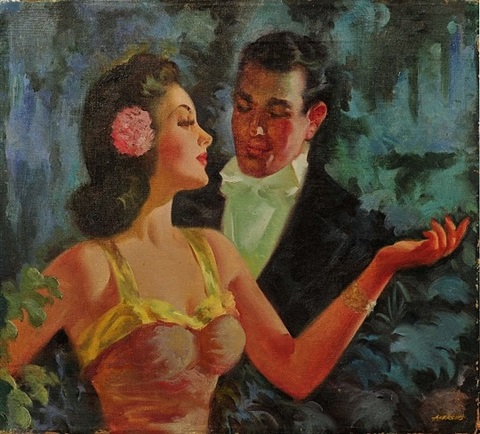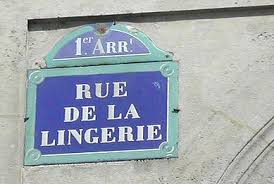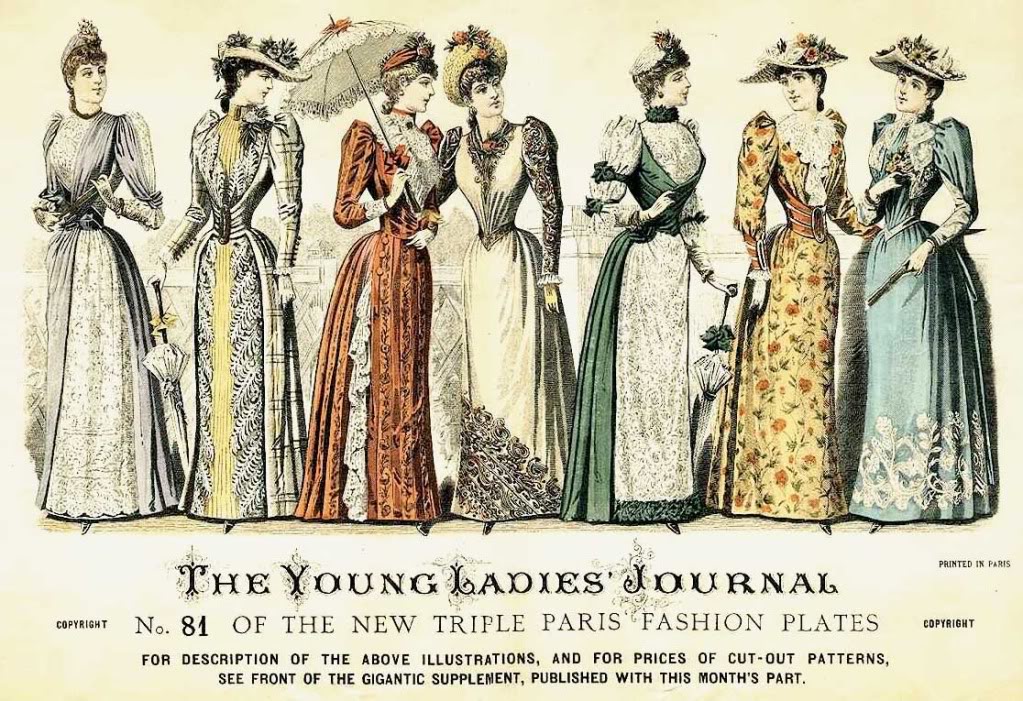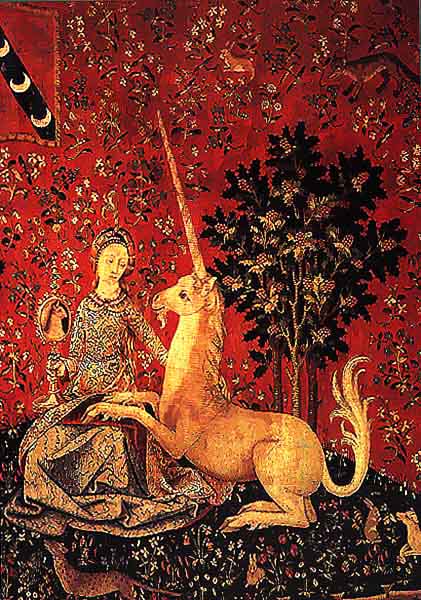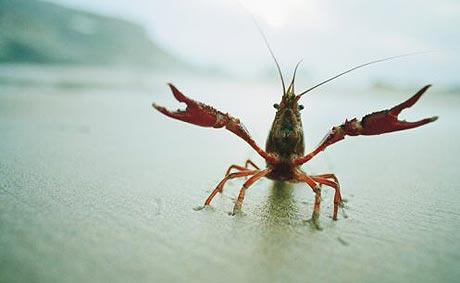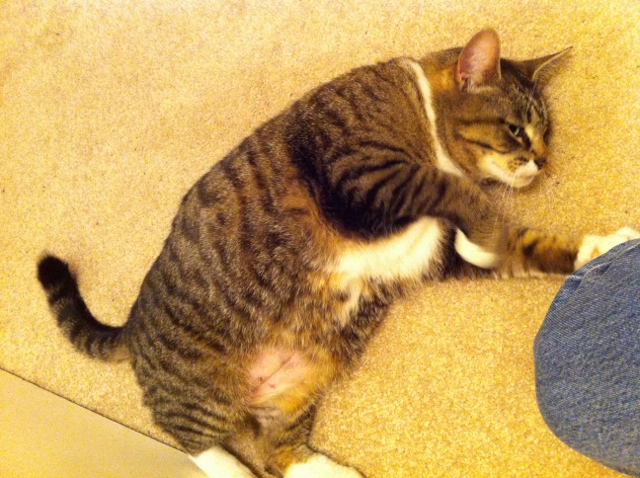
posted by Simon Kemp
Given that the internet is made of cats, there’s no reason for this blog to be an exception, so here, accompanied by an image of my own overweight and slightly moth-eaten chat tigré, is a post on the subject. Tigré is another of my favourite words, not just because I own a chat tigré myself, but because it makes the cat sound very much cooler than in its English translation, tabby cat. My Larousse dictionary lists tigré as a simple adjective, which ‘se dit d’un pelage marquée de taches, de bandes plus foncées’ [‘refers to fur marked with darker patches or stripes’]. The online Trésor de la langue française goes one better, though, identifying it as the past participle of a rare verb, tigrer quelque chose, ‘to tiger-stripe something’. It even has a few literary examples of usage, including the following from Huysmans: ‘l’épiderme se tigre de taches jaunes’ [‘the epidermis is tiger-striped with yellow marks’]. It strikes me as an unfortunate lapse that English never thought to make tigering a verb, and it never occurred to us that our tabby cats might have been tigered.
Cats turn up in all kinds of idioms and proverbs in French. I think, although I’m not sure of this, rather more frequently than they do in English. Rarely the same ones though. You don’t set the cat among the pigeons in French, for instance, on jette un pavé dans la mare (‘throw a cobblestone into the pond’). You don’t let the cat out of the bag but vendre la mèche (literally, ‘sell the wick’, but in an archaic sense meaning, more or less, ‘reveal the fuse that leads to the hidden gunpowder’). And nor does it rain cats and dogs: in France, rather less surreally, il pleut des cordes (‘it rains ropes’). Weirdly, though, a French idiom will often map exactly onto its English equivalent in image and sense, except for the fact that the French have substituted a cat for various items used in the English expressions. French people do not have a frog in their throat, ils ont un chat dans la gorge; they do not call a spade a spade, ils appellent un chat un chat; they do not tell each other to let sleeping dogs lie, they warn that il ne faut pas réveiller le chat qui dort;and they do not have other fish to fry, ils ont d’autres chats à fouetter. And yes, the French are whipping those cats in that last expression, but English speakers have no cause to feel morally superior: the French simply complain about cramped accommodation that il n’y a pas la place de se retourner (‘there isn’t room to turn around’), without having recourse to cruel and unusual cat-swinging to express their dissatisfaction.
Occasionally the two languages agree on the uses of cats: both of us can play cat and mouse with someone / jouer au chat et à la souris avec quelqu’un, for instance. And there must presumably be some link between the French expression, donner sa langue au chat, meaning to give up trying to guess something, and the not-quite-matching English idea that a ‘cat’s got your tongue’ when you’re too inhibited to speak, with its equally peculiar image. They also have a good stock of cat-expressions all their own, such as the proverbs, ‘chat échaudé craint l’eau froide’ (‘a scalded cat fears cold water’), which is near-equivalent to our ‘once bitten, twice shy’, but, when you think about it, isn’t exactly the same idea, plus the wonderful ‘la nuit, tous les chats sont gris’ (‘at night, all cats are grey’), which has nothing like it at all in English, and refers in French to how darkness (and, perhaps, other kinds of obscurity) hide the differences by which we classify and distinguish people. It’s incidentally also the title of the chapter of Les Trois Mousquetaires I talked about here, where d’Artagnan pretends to be the Comte de Wardes in Milady’s darkened bedroom.
Finally, it’s not just in language, but in French culture generally that cats have prominence. No less than three of the poems in Baudelaire’s Les Fleurs du mal are about cats. Here’s my favourite:
Les Chats
Les amoureux fervents et les savants austères
Aiment également, dans leur mûre saison,
Les chats puissants et doux, orgueil de la maison,
Qui comme eux sont frileux et comme eux sédentaires.
Amis de la science et de la volupté
Ils cherchent le silence et l’horreur des ténèbres;
L’Erèbe les eût pris pour ses coursiers funèbres,
S’ils pouvaient au servage incliner leur fierté.
Ils prennent en songeant les nobles attitudes
Des grands sphinx allongés au fond des solitudes,
Qui semblent s’endormir dans un rêve sans fin;
Leurs reins féconds sont pleins d’étincelles magiques,
Et des parcelles d’or, ainsi qu’un sable fin,
Etoilent vaguement leurs prunelles mystiques.
And (loosely) translated by Roy Campbell :
Cats
Sages austere and fervent lovers both,
In their ripe season, cherish cats, the pride
Of hearths, strong, mild, and to themselves allied
In chilly stealth and sedentary sloth.
Friends both to lust and learning, they frequent
Silence, and love the horror darkness breeds.
Erebus would have chosen them for steeds
To hearses, could their pride to it have bent.
Dreaming, the noble postures they assume
Of sphinxes stretching out into the gloom
That seems to swoon into an endless trance.
Their fertile flanks are full of sparks that tingle,
And particles of gold, like grains of shingle,
Vaguely be-star their pupils as they glance.
The others are here and here. Better known even than Baudelaire’s cats, though, is the cat belonging to sixteenth-century essayist, and master of thought-provoking quirkiness as literary style, Michel de Montaigne:
‘Quand je me jouë à ma chatte, qui sçait si elle passe son temps de moy plus que je ne fay d’elle?’
(‘When I play with my cat, who knows if I am not a pastime to her more than she is to me?’)
… he famously wondered, as has many a cat-owner in his wake.
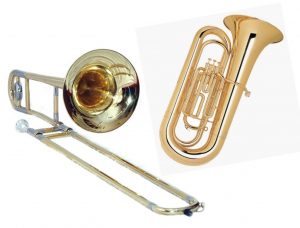


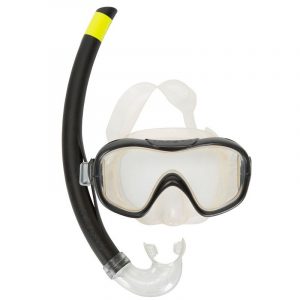


 posted by
posted by 